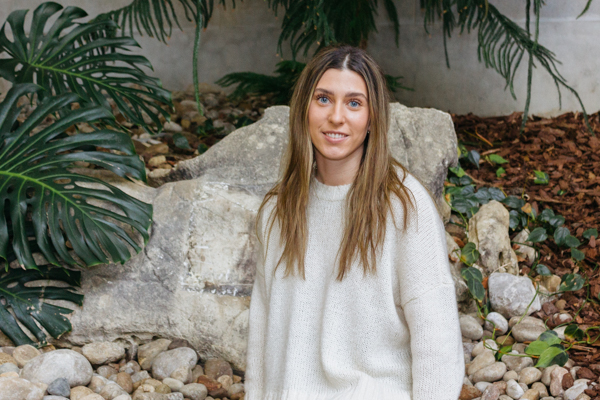Admissions
Equity, Diversity, Inclusion and Decolonization
The School of Graduate and Postdoctoral Studies is committed to equity, diversity, inclusion and decolonization in all aspects of graduate and postdoctoral studies. For more information regarding these commitments please visit grad.uwo.ca/edi-d.
Anatomy and Cell Biology
Master of Science (MSc)Meet Tiffany Johnston, MSc candidate in Anatomy and Cell Biology

Why did you come to Western for your graduate degree?
I got exposure to research in my fourth year of undergrad being an undergrad thesis student in Dr. Trevor Shepherd’s lab. I was very interested in the work that the lab does, and enjoyed the lab atmosphere, so I decided to approach Dr. Shepherd about staying on as a Master’s student. Apart from that, I really enjoyed my time at Western as an undergrad. There are many clubs and activities available on campus, making this fairly large school feel like a tight-knit community.
Do you engage in volunteer activities?
I am a volunteer tutor with the Ghanaian Association London Middlesex Homework Club. I also volunteer with Kids Kicking Cancer helping with the programming they offer to children.
Describe your research.
I work for Dr. Shepherd in the Translational Ovarian Cancer Research Lab located at Victoria Hospital. Specially, we focus on studying the metabolic changes that occur in epithelial ovarian cancer (EOC) spheroids. Spheroids are macroscopic clusters of cells that mediate the metastatic process of EOC. One of the processes that is activated in spheroids is called autophagy (which translates from Greek to “self-eating”). I look at pharmacologically inhibiting this process by targeting autophagy initiation with small molecule inhibitors. Further, I investigate how autophagy inhibition could be combined with chemotherapy as a strategy to prevent metastasis, disease progression, and chemoresistance.
What is it about your grad program that enables you to thrive and be successful?
There are a couple of things. The first would be my colleagues in the Shepherd lab. The lab has a nurturing environment, allowing us to ask questions and bounce ideas off one another. Additionally, my supervisor is very supportive but lets his students work independently. This allows me to build on my problem-solving skills. Another important part is the seminar course that we are required to take in this program. This course is built upon developing presentation skills. This is an essential skill for researchers as clearly presenting findings is what makes research meaningful.
Program Websites
Program Contact
Margaret Dow (anatomy@uwo.ca)Academic Program Coordinator
Department of Anatomy & Cell Biology
Western UniversityMedical Sciences Rm 443
London, Ontario N6A 5C1
t. 519-661-2111 ext. 81524
f. 519-850-2906
The Anatomy & Cell Biology Program offers a modern collaborative training experience catering to the needs of the individual student pursuing an MSc degree. Our dedicated, award-winning mentors and state-of-the-art facilities provide a rich training environment in which students can immerse themselves in one or more academic disciplines, including cell biology, neurobiology, anatomical sciences, and/ or education scholarship.
The thesis-based option is research-intensive and designed to prepare students for a career as a research scientist in academia or industry.
The project-based option offers a unique clinical training experience consisting of course work, research, and hands-on teaching experience; and is intended to prepare the next generation of medical educators and scholars.
Program Length
- 5 Terms (Project-based)
- 6 Terms (Thesis-based)
Program Design
- Full-time study
- Project based or thesis-based
Funding Information
Applicants are encouraged to apply for the following scholarships (if eligible):
Tuition and Fees
Tuition and fee schedules (per term) are posted on the Office of the Registrar's website at http://www.registrar.uwo.ca/student_finances/fees_refunds/fee_schedules.html
Graduate Student Affordability Calculator
Use this helpful tool to estimate how much money you will need to pay for your tuition, fees, housing, food, and other necessities for a 12-month (three term) academic year.
Admission Requirements
- 4-year honours degree or equivalent, in a Life or Allied Health Science, or a degree in Dentistry, Medicine or Veterinary Science.
- Minimum 80% (A-) average for the most recent two years of undergraduate study, or the most recent 10 full senior level courses.
Additional Requirements
- Research experience is recommended for the thesis-based curriculum option.
English Language Proficiency
Applicants whose first language is not English must furnish evidence of their proficiency in the use of the English language:
- The Test of English as a Foreign Language (TOEFL). Minimum acceptable score is 92 for the internet version with no individual score below 20. [Western's TOEFL ID is 0984].
- The International English Language Testing Service (IELTS Academic). Minimum acceptable score is 7 out of 9.
Application Deadline
Project-based option
- January 15 - Acceptance notification begins in April and continues until July 31
- February 1 - Summer Term and Fall Term
- June 1 (pending spots remaining) - Fall Term
- October 15 - *Winter Term
*Positions are not regularly available for summer/winter terms. Acceptance notifications for the fall term begin in March and continue until July 31.
Fields of Research
- Cell Biology
- Clinical Anatomy
- Neurobiology






